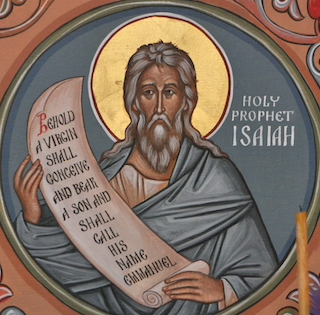8th century Before Christ
Life
Writings
Prophecy of Isaiah of JerUsalem
Overview
The book of the Prophet Isaiah is one of the largest of the major prophetic books in the Old Testament. It is attributed to the prophet Isaiah, who lived in the 8th century BCE and was a messenger of God to the kingdom of Judah. The book of Isaiah consists of 66 chapters and can be divided into three main sections written over a long period of time.
First Isaiah (chapters 1-39)
Primarily focuses on the historical context of the time and contains prophecies regarding the impending judgment upon Judah and other nations. Isaiah denounces the sins of the people and calls them to repentance, warning of the consequences of their actions. However, amidst the messages of judgment, there are also glimpses of hope and restoration, pointing to the coming of the Messiah and the future redemption of God’s people. It likely dates from around 740 to 700 BCE.
Second Isaiah (chapters 40-55) (During Exile)
Often referred to as “Deutero-Isaiah” or the Book of Consolation. It was likely written during the Babylonian exile, offering comfort and hope to the exiled Israelites. This section contains beautiful poetic passages, emphasizing God’s mercy, faithfulness, and the promise of salvation. It foretells the coming of a “Suffering Servant”, the Messiah, who will bring salvation not only to Israel but to all nations. It was composed approximately between 540 and 515 BCE.
Third Isaiah (chapters 56-66) (Post-Exilic)
Focuses on the future restoration of Jerusalem, the establishment of God’s kingdom, and the ultimate judgment of the wicked. It encourages the people to remain faithful to God’s commandments and to live lives of righteousness and justice. It is believed to have been written after the return from Babylonian exile, possibly in the late 6th century or early 5th century BCE.
Importance to Christians
“[Isaiah’s] oracles provided the foundations for hope and later reflection and speculation. His oracles provided the foundations for hope for later prophets in the time of exile, such as the authors of the last half of the Book of Isaiah in chapters 40-50 and 56-66. They also stirred the messianic hopes of postexilic prophets such as Haggai and Zechariah, and of the early Christians who quoted Isaiah more than any other book of the Old Testament to explain the meaning of Jesus.“
– Reading the Old Testament, Boadt, p292
The Virgin Birth of Christ
Isaiah 7:14 is the key Old Testament prophecy regarding the Virgin Birth. The verse states,
“Therefore the Lord himself will give you a sign: Behold, a virgin shall conceive, and bear a son, and shall call his name Immanuel.”
This prophecy foretells of the miraculous birth of Jesus Christ according to the Gospel of Saint Matthew.
Matthew 1:22-23 explicitly references Isaiah’s prophecy. It reads,
“All this took place to fulfill what the Lord had said through the prophet: ‘The virgin will conceive and give birth to a son, and they will call him Immanuel’ (which means ‘God with us’).”
Here, Matthew is drawing a direct line from Isaiah’s prophecy to the birth of Jesus, affirming that Jesus’ birth by the Virgin Mary is the fulfillment of Isaiah’s words.
These references form a critical link between the Old and New Testaments, proclaiming the fulfillment of prophecy in the virgn birth of Jesus Christ and affirming His divine nature at the same time.
Links between the Prophet Isaiah and the New Testament
1. Matthew 3:3, Luke 3:4-6 and John 1:23 all refer to Isaiah 40:3, about a “voice crying in the wilderness”, preparing the way for the Lord; which is fulfilled in the person and ministry of the Holy Prophet and Forerunner, Saint John the Baptist.
2. Matthew 4:14-16 cites Isaiah 9:1-2, about the “people in darkness seeing a great light”, in the context of Jesus’ ministry in Galilee.
3. Matthew 8:17 references Isaiah 53:4, speaking of Jesus taking our infirmities and bearing our sicknesses.
4. Matthew 12:17-21 quotes Isaiah 42:1-4, describing the chosen servant of God (Messiah or Christ) who will bring justice to the nations.
5. Matthew 13:14-15 echoes Isaiah 6:9-10, about people’s hearts being calloused, and their ears hard of hearing to spiritual Truth.
6. Both Matthew 15:7-9 and Mark 7:6-7 refer to Isaiah 29:13, about people honoring God with their lips while their hearts are far from Him.
7. Luke 4:17-21 – Jesus reads from Isaiah 61:1-2 in the Jewish synagogue, about the Spirit of the Lord being upon Him, thus proclaiming that He is the Messiah, the Christ, the Savior of the world.
9. John 12:38-41 refers to Isaiah 53:1 and Isaiah 6:10, discussing the disbelief among the people.
10. Acts 8:28-33 describes an Ethiopian eunuch reading
Isaiah 53:7-8, which Philip explains is about Jesus.
11. Romans 9:27-29 – Paul cites Isaiah 10:22-23 and Isaiah 1:9, discussing the “remnant of Israel” that will be saved.
12. Romans 10:16 refers to Isaiah 53:1, about who has believed the message of salvation in the Messiah (Christ).
13. Romans 10:20-21 quotes Isaiah 65:1-2, about God revealing Himself to those not seeking Him and being found by those not asking for Him – this understood to be the Gentiles.
13. Romans 15:12 refers to Isaiah 11:10, about the root of Jesse rising to rule over the nations. This has Messianic implications since David is the son of Jesse, and the Messiah will be from the Davidic line.
15. 1 Peter 2:22 references Isaiah 53:9, about Jesus committing no sin nor deceit.
16. Revelation 7:16-17 echoes Isaiah 49:10, about the Lamb leading them to springs of living water.
The above list is certainly not exhaustive, but for these reasons, to name a few, the book of the Holy Prophet Isaiah is often known as the “Fifth Gospel” because in it the Good News of Jesus Christ is clearly found.
Sources:
- The Prophets by Abraham Heschel
- The Old Testament Introduction: Prophetic Traditions by Paul Nadim Tarazi
- The Expositor’s Bible Commentary (EBC)
- Reading the Old Testament by Lawrence Boadt
- ChatGPT-4 (summarization and Scripture correlation assistance)
Troparion — Tone 4
With a great voice like that of a trumpet, / you proclaimed the coming of Christ to the world. / You were revealed as a swiftly-writing scribe of the things to come; / therefore, we acclaim you with hymns, / most illustrious prophet Isaiah.
Kontakion — Tone 2
Endowed with the gift of prophecy, / prophet-martyr Isaiah, herald of God, / you made clear to all the incarnation of Christ / by proclaiming with a great voice: / “Behold, the Virgin shall conceive in her womb.”
Feast Day(s)
May 9th – Feast
Icon image source: https://www.flickr.com/photos/frted/5692628918

